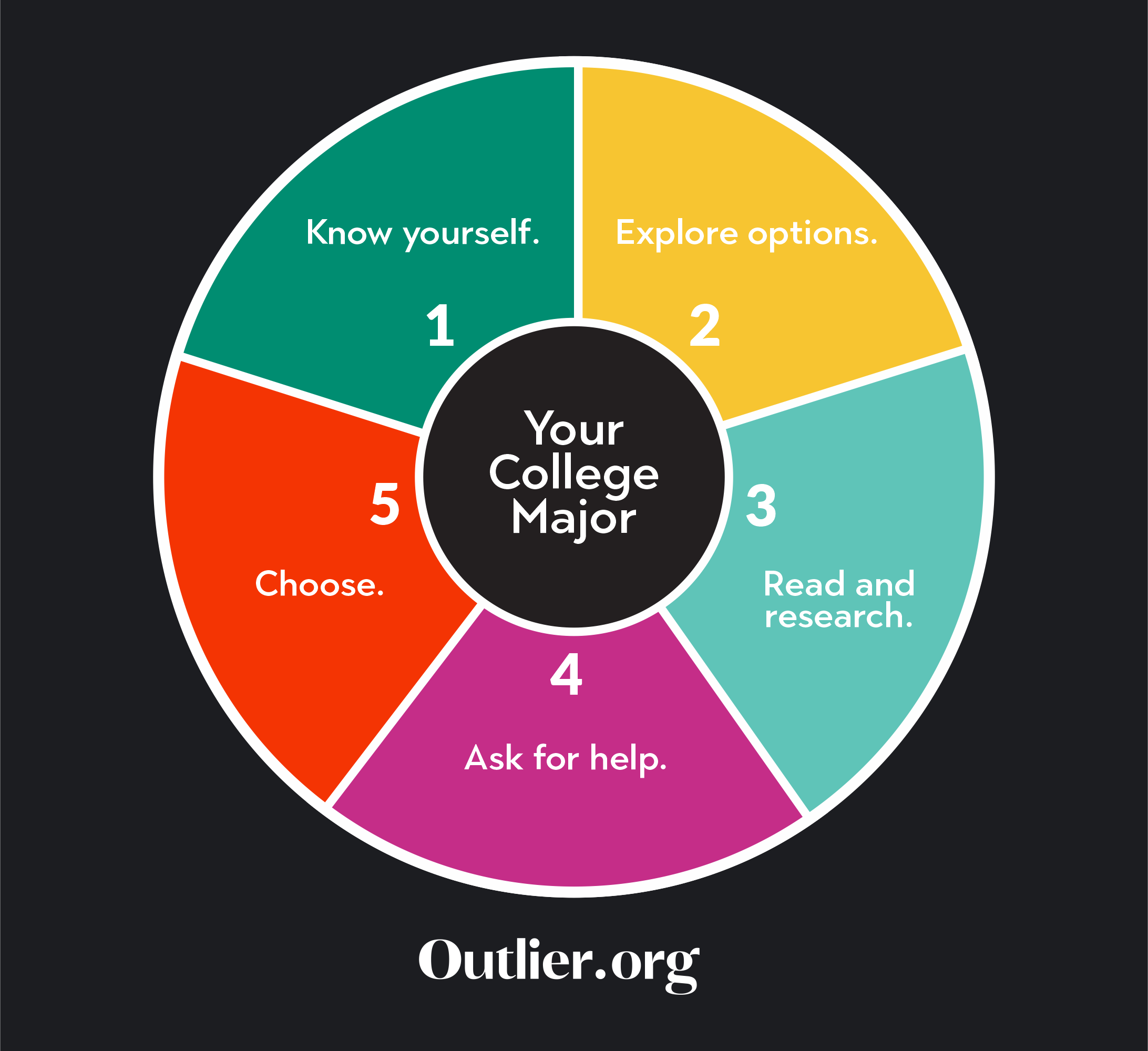In This Article
What Is a College Major?
What Are My Options?
When Do I Declare My Major?
Why Is Choosing the Right Major Important?
Can I Change My Major?
5 Questions To Ask Yourself Before Choosing a Major
5 Steps To Choosing a Major
Choosing a major can be one of the highlights of your college experience. It’s about finding your niche, making the most of exciting opportunities, considering multiple career options, and discovering who you are. This is only one decision in your college search and there’s no “right” way to do it.
So forget the stress and focus on the positives: think of all the wonderful things you want to achieve with your college degree.
Save the planet, cure cancer, revolutionize diplomacy, achieve world peace… You can do it all, you just need a little direction. That’s where your college major comes in.
What Is a College Major?
Your college major is the subject area in which you specialize. It’s a special academic niche that can lead you to your career path, research opportunities, and further passions. Your major is important. It contributes to around a third of your bachelor’s degree, with another third being your general education/core curriculum requirements and the final third being your electives.
| TYPE OF COURSEWORK | PERCENTAGE |
| General Education/ Core Requirements | 33% |
| Major Related | 33% |
| Electives | 33% |
What Are My Options?
You will have so many options to choose from when you get to college. From majoring in Anthropology to Business, from Engineering to History, and from Visual Arts to Zoology, the choice will be endless. Most colleges in the US will have a range of popular majors to choose from, with certain colleges having exceptional resources, faculty, or opportunities in particular fields.
Beyond particular majors and areas of study, you also might have options to:
Double major or specialize in two subjects
Have a major and a minor, where you specialize fully in one area and a little less in another
Create your own major, where you combine interdisciplinary subject areas
Several universities, including the College of William & Mary, are developing this “self-designed major” approach which enables students to combine subjects across disciplines.
A few colleges even have no majors at all. Sarah Lawrence College and Brown University are unique in having “concentrations” that integrate into their free-form curricula. While there are specific requirements, students can be the “architects of their own education” and self-design their own course of study.
"I loved being able to design my own education: I found my passion for translated 19th century French poetry and still explored Italian, dance, & anthropology. Because of this independence and freedom I found, I learned how to question, challenge, and better both myself and the wider world. I hope, always, to continue learning as I grow as a woman, writer, translator, editor, liberal arts believer…”
–-Sarah Lawrence graduate, French & Anthropology concentration, from the book Uni in the USA by Anthony Nemecek and Daisy Hill
When Do I Declare My Major?
While it varies from college to college, many will ask you to declare your major towards the end of your sophomore year. This means you have freshman and sophomore years to fulfill your general education requirements/core curriculum, explore your passions, and discover your major. With some programs, such as Outlier’s College Foundation certificate, you can complete needed prerequisites while exploring majors and earning credits.
Almost all majors will have prerequisites; you can’t just major in math without having some knowledge of calculus, geometry, and trigonometry. So, the preparation you need to declare your major will start before the end of your sophomore year. Often, declaring a major on your application for college can give admissions a clearer idea of how you want to shape your education.
You can absolutely apply undecided. That is one of the wonderful things about admissions. However, specifying a passion (or passions!) you want to pursue can be key to a successful application.
If you want help evaluating your degree path, you can take advantage of free resources such as taking a college success course or the Greenwood System 45 Career & Educational Assessment.
Once you’re at college, you can also, and during freshman and sophomore year, you then need to:
Speak to your academic advisor
Research potential major requirements (GPA, internships, fields of study)
Shape your class schedule so that you’re prepared to major in the subject you want
Why Is Choosing the Right Major Important?
Even if the world wasn’t defined by specializations, as it so often is, being happy and successful requires some knowledge of your strengths, weaknesses, interests, and abilities. Whatever your future, whatever your direction, choosing the right major enables you to find your passions, develop your skills, and discover your place in the world.
“I took a chance and majored in something that I enjoyed, rather something that I was told had 'trajectory' - I don't regret it. I learned how to write, use grammar, think creatively and be expressive - all skills that are applicable in just about any job. I've worked to make my English degree applicable to the jobs that I want.”
–-University of North Carolina at Chapel Hill graduate, English major, from the book Uni in the USA by Anthony Nemecek and Daisy Hill
Can I Change My Major?
Yes, most college students change their major several times during their degree and still graduate on time. Try a few things out, choose the subjects you enjoy, and discover the way forward.
However, there’s another twist. For a few particular pre-professional majors—like business, engineering, film, and nursing—changing your major can be a little more difficult. These particular majors will have a more substantial list of prerequisites, many of which you will have started in high school.
For example, if you’re aiming to major in Film Production at Chapman’s Dodge College of Film & Media Arts, your application must include a Creative Supplement formed of a personal statement, a creative resume highlighting 5-7 of your pieces, and a visual sample. To have created all this material for your application, you must have been creating during high school.
Then, once you’re at college, if there are even more specific prerequisites needed for your chosen field, you’ll find satisfying these requirements is your main goal. For example, if you were to major in Nursing at UCLA, you would have to take specific classes in Chemistry, Communication Studies, Life Sciences, Psychology, Nursing, Biostatistics, and Medical Microbiology. Equally, if you were to major in Business Administration at Northeastern University, you’d be required to enroll in several co-operative programs, alternating your academic study with full-time work. All of these requirements fill up your academic schedule, meaning you have less time for exploration and therefore less ability to change your major.
Of course, there are always exceptions, but it’s worth asking yourself a few questions before you begin to choose your major.
5 Questions To Ask Yourself Before Choosing a Major
What do you hope your future will look like?
What are your career options? Have you done any internships or work experiences in your potential field of study & know it’s a good match?
Do the universities you’re considering have specific opportunities, faculty, and resources for your particular major?
Are you on the right path to having the right classes, coursework, and number of credits to choose this major?
Are there other options you haven’t considered?
5 Steps To Choosing a Major
1. Identify your Passions, Values, and Abilities
This is really where it all starts—focus on you. If writing is your main skill, think about Journalism or English. If one of your main values is to leave the world a better place, then consider Politics or Environmental Policy. If you can’t choose between your passions in art and chemistry, look at Art Restoration. The possibilities are endless, but you first need to identify what you’re best at, what you value, and what you love.
To do this, look for patterns & similarities in:
Your current high school classes
Your values, ideals, and beliefs
Your skills and abilities (the Myers-Briggs Type Indicator)
Your interests
Your career goals and future dreams
2. Think Ahead to the Future and Your Career Path
College is one of the greatest ways to prepare yourself for the real world—your future career will be a significant part of life after college, so you need to be cognizant of how your major will be applicable outside of college.
To do this, ask yourself:
Is there a future career at the end of this major?
Will this field of study exist in ten years?
What will I bring to the job market?
Will I be able to change career paths and still utilize the skills I’ve learned?
3. Read and Research
Read in and around your field of study to understand the required coursework and ask yourself whether you can see yourself studying it for the next few years. Research successful college graduates and learn what they majored in and where they are now; it might be that their job has nothing to do with their major but maybe it does. I know students who majored in Pharmacy and are now Accountants. It happens. You’ll never know unless you research.
4. Ask for Help
You don’t have to do it all on your own—use the resources that you have. Speak to your parents, your high school friends, college students, college graduates, the Career Counseling department, and, most importantly, your academic advisor. Everyone will have an opinion or some advice for you but it’s up to you to filter it and find where you’re happiest with your choice.
5. Choose
After all your considering, list-making, asking, researching, and the decision-making process, just remember that this is your future. Choose what makes you happy and what you believe will help you become successful. Change your mind, take your time, and just follow where your bachelor’s degree takes you.
Your major choice will not be the end of anything—it’s just the beginning.
About the Author
Bob Patterson is a former Director of Admissions at Stanford University, UNC Chapel Hill, and UC Berkeley; Daisy Hill is the co-author of Uni in the USA…and beyond published by the Good Schools Guide 2019. Together, they have established MyGuidED, a new educational tool for students looking to apply to university (launching 2023).
Degrees+: Discover Online College Unlike Anything You’ve Experienced
Outlier (winner of TIME Best Inventions 2020) and Golden Gate University (#1 school for working professionals) have redesigned the experience of earning a college degree to minimize cost and maximize outcomes. Explore a revolutionary way to earn your college degree:




